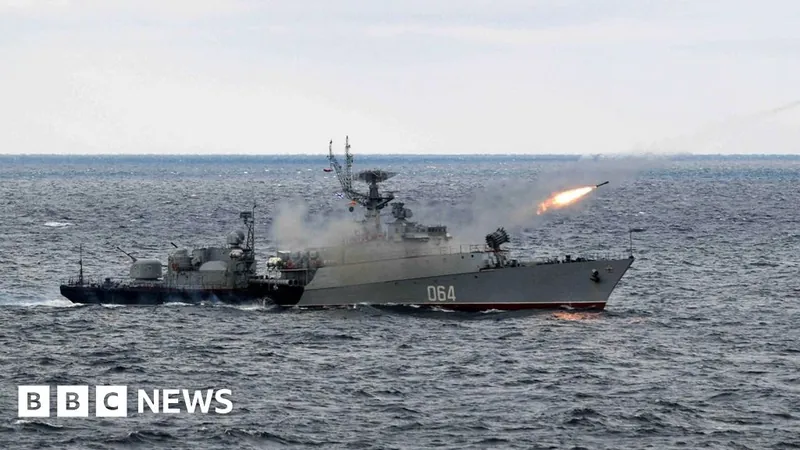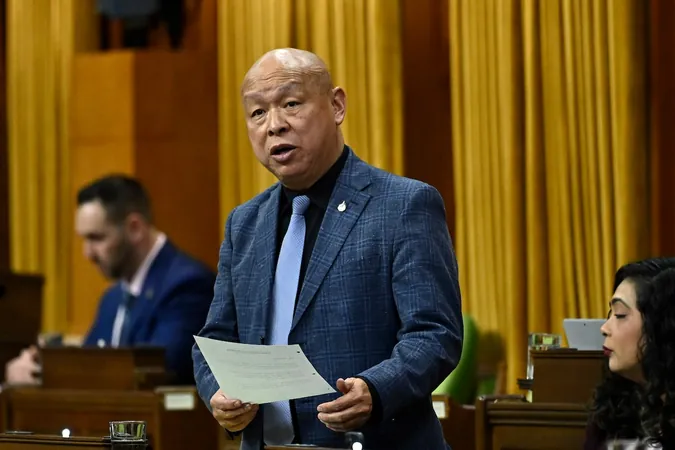
Russia Demands Sanction Lifts as Condition for Ukraine Maritime Ceasefire
2025-03-26
Author: Michael
In a significant escalation of diplomatic tension, Russia has declared that selected Western sanctions must be lifted before it will agree to a maritime ceasefire with Ukraine. This statement follows the announcement by the United States that both countries had tentatively agreed to pause hostilities in the Black Sea during negotiations held in Saudi Arabia.
Shortly after the U.S. announcement, the Kremlin issued a caveat: any maritime ceasefire would only occur contingent upon the revocation of sanctions targeting specific Russian banks, including the state agricultural bank, Rosselkhozbank. Restoring these banks' access to the crucial SWIFT international payment system is also among Russia's requirements for compliance.
In a striking contradiction to the prospect of ceasefire, Ukrainian officials reported a drone attack launched by Moscow on the port city of Mykolaiv. Ukrainian President Volodymyr Zelensky characterized these strikes as 'a clear signal' that Russia is not genuinely interested in achieving peace.
Western nations, particularly the European Union, previously suspended access to the SWIFT system for several Russian financial institutions as a response to the full-scale invasion of Ukraine. This measure significantly hampered the operational capability of Russian companies to conduct instantaneous transactions, impacting the country’s lucrative energy and agricultural exports. To restore access to SWIFT would require a consensus from EU member states, which appears increasingly difficult given the ongoing support for Kyiv.
A European Commission spokesperson emphasized that any reconsideration of sanctions would hinge on the full withdrawal of Russian forces from Ukraine. This aligns with a broader narrative that lacks concrete assurances from Russia regarding military aggression.
U.S. President Donald Trump expressed skepticism, suggesting Russia might be stalling in its commitments to end the conflict. He noted, 'I think that Russia wants to see an end to it, but it could be they're dragging their feet,' echoing concerns among analysts about Moscow's intentions.
While the U.S. has played a mediator role in brokering the maritime ceasefire, conflicting statements have emerged from both Kyiv and Moscow regarding the exact terms and timing of the agreement. President Zelensky asserted that sanctions relief was not a prerequisite for the ceasefire to take effect, dismissing Russia's conditions as attempts to manipulate negotiations.
Historically, the Black Sea has not been a primary battleground in recent months. Early in the conflict, Ukraine successfully targeted and diminished Russia's naval capabilities, destroying numerous vessels. Consequently, Ukraine has been able to maintain near pre-war levels of grain exports by maneuvering shipping routes along the western coastline.
Experts, such as Dr. Jenny Mathers, a senior professor of international politics, indicate that a maritime ceasefire could disproportionately benefit Russia, which has faced challenges exporting its own agricultural products. With Ukraine managing to preserve shipping routes, Russia’s ability to leverage the Black Sea for exports has diminished significantly.
In 2022, the Black Sea Grain Initiative was established to facilitate the passage of commercial ships related to Ukraine's agricultural products, aided by UN involvement to ensure the safe export of Russian food and fertilizer. However, Russia's withdrawal from this agreement in summer 2023, citing hindrances from sanctions, has increased the risk of navigating the area, with any vessels bound for Ukraine now labeled as military targets by Moscow.
The United Nations recently underscored that maintaining freedom of navigation in the Black Sea is vital not only for regional stability but also for global food security and supply chains, urging collaborative efforts to resolve the ongoing crisis efficiently.
As tensions unfold, the stakes remain high. The outcome of the maritime ceasefire talks could have lasting implications for both nations and the broader international community, especially regarding food security as winter approaches.









 Brasil (PT)
Brasil (PT)
 Canada (EN)
Canada (EN)
 Chile (ES)
Chile (ES)
 Česko (CS)
Česko (CS)
 대한민국 (KO)
대한민국 (KO)
 España (ES)
España (ES)
 France (FR)
France (FR)
 Hong Kong (EN)
Hong Kong (EN)
 Italia (IT)
Italia (IT)
 日本 (JA)
日本 (JA)
 Magyarország (HU)
Magyarország (HU)
 Norge (NO)
Norge (NO)
 Polska (PL)
Polska (PL)
 Schweiz (DE)
Schweiz (DE)
 Singapore (EN)
Singapore (EN)
 Sverige (SV)
Sverige (SV)
 Suomi (FI)
Suomi (FI)
 Türkiye (TR)
Türkiye (TR)
 الإمارات العربية المتحدة (AR)
الإمارات العربية المتحدة (AR)